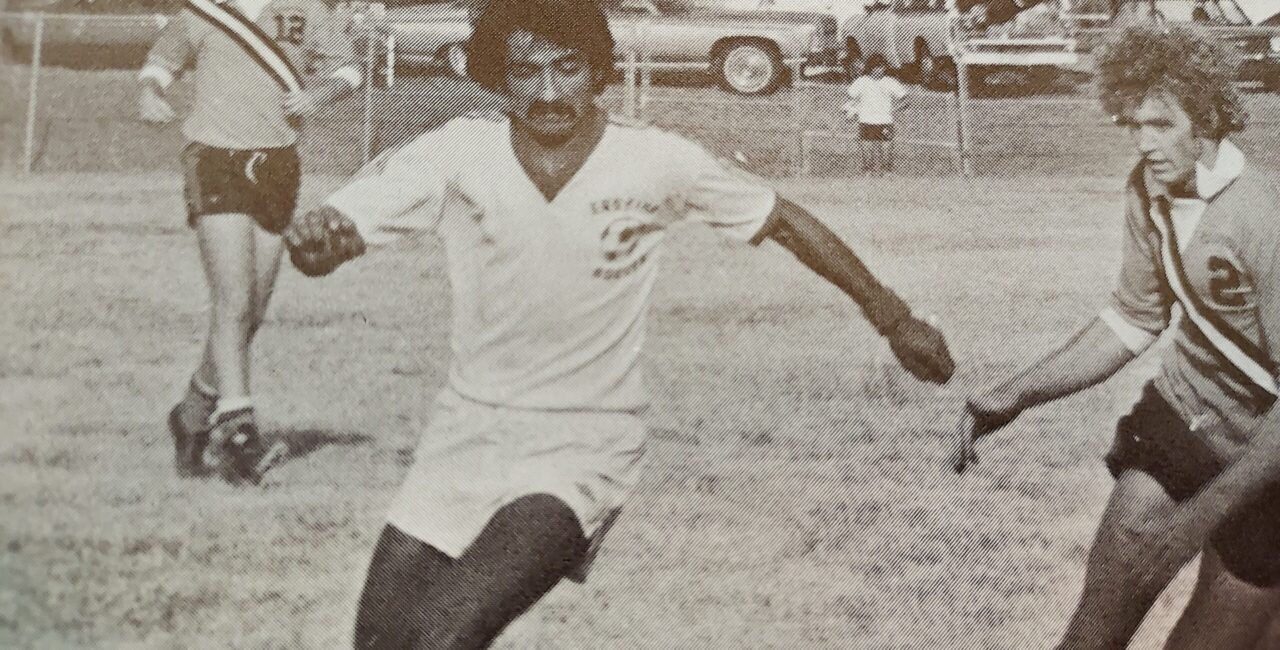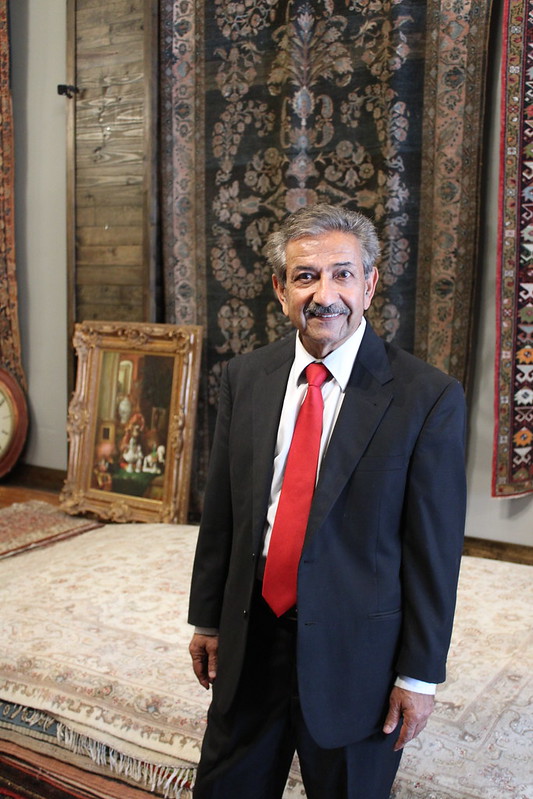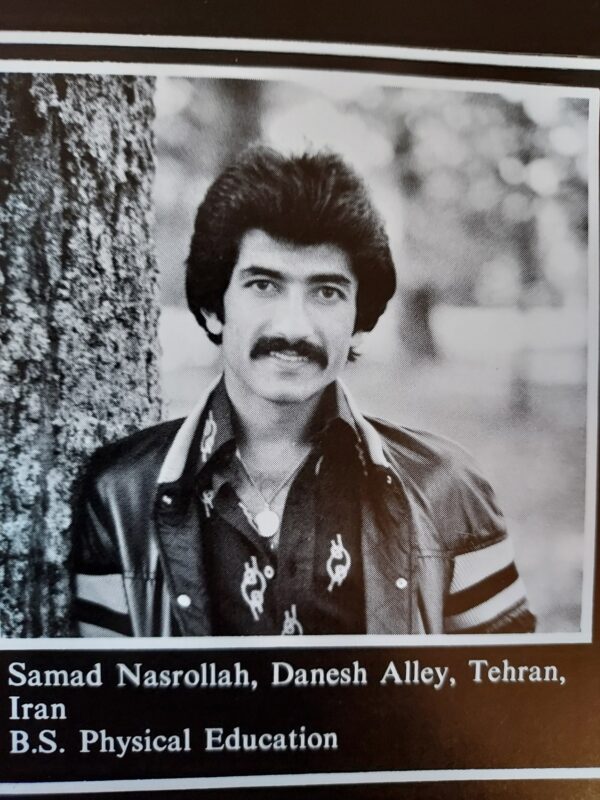
From Tehran to Due West: How the people of Erskine made a difference

When Samad “Sammy” Nasrollahi ’80 (pictured above, center, during his days as a Fleet soccer player) emigrated from Iran to the United States in 1974, he had never heard of Due West, much less Erskine College. How does a young man go from Tehran to Chicago to Upstate South Carolina? It was an unexpected personal connection that brought him to Erskine, but it is the consistent kindness and friendship he found here that keeps him connected to his alma mater to this day.
Following a dream
As a teenager growing up in Iran, Sammy was determined to succeed. He developed his skills as a soccer player, taught himself English from a dictionary, and worked multiple jobs to help support his family. At 17, he earned a place in Division I soccer—becoming Iran’s youngest player in the division. All the while, he was saving money for a move to the United States.
When he was 20, Sammy obtained a visa and moved to Chicago where he played in the National Soccer League, studied, and worked in a restaurant managed by a fellow Iranian. That’s when Erskine suddenly came into the picture.
Sammy was planning to attend Eckerd College in Florida, but his manager at the restaurant had another suggestion: What about Erskine College? The manager’s brother, Ali Regimand ’78, was a student at Erskine, playing soccer for Coach Ralph Lundy.
“After I met Ali and heard how highly he thought of Coach Ralph Lundy, I accepted the offer from Erskine and turned down the full scholarship to Eckerd,” Sammy recalls.
Culture shock and community
Sammy’s transition into life in Due West was bumpy at first. He was older than most of the other students, and he was unaccustomed to life in a rural town.
“You can imagine the culture shock,” Sammy says. “I left Tehran with a population of 4,273,000 at that time to move to Chicago with 7,160,000 people. I had no idea that Due West, South Carolina had less than 2,000 residents if you counted the cows!”
Sammy was used to overcoming challenges, though, and he found the Erskine community welcoming. He obtained a work-study job in Erskine’s “Canteen” and was befriended by his manager, Geneva Young. “Ms. Geneva took me into her home like I was one of her own, and I am still in contact with her children today,” Sammy says.

Many Erskine faculty and staff members surrounded him with friendship and support. Among those who made a positive impact on him, Sammy names the Carter family— Director Emerita of Admissions and Financial Aid Dorothy J. “Dot” Carter was then a staff member in Financial Aid. He also cites the Haldeman family—Public Relations Director Richard Haldeman and his wife Dr. Jan Haldeman, now Professor Emerita of Biology—whose daughter, Robin Haldeman Talbot ’80, was a classmate. He praises Coach Ralph Lundy as “the best coach and the best friend I had there,” and adds, “We are still in contact today.”
In the Erskine community, Sammy found not only friendship, but love. He met his wife, Janice Rose ’79 on campus. “We first met when she came to the Canteen with her friends and ordered chicken to go. I asked her if she wanted me to put legs on it. She didn’t think it was funny but her two friends laughed and laughed.”
Later, the two got to know each other in a speech class. “She always laughed at me because my English wasn’t perfect,” Sammy says, “but I made an A in the class and she got a B. I still tease her about it.”
Sammy and Janice have been married for 43 years. They have three children and four grandchildren. Their two sons, Joshua Shaheen and David Ali are both attorneys, and their daughter Miriam Miranda is a Registered Dietitian and Nutritionist.
Crisis

Sammy was a senior in 1979 when the Iranian Hostage Crisis erupted. He remembers that “at many colleges and universities in the U.S., students were in conflict with students from Iran,” and some Iranian students at other colleges were injured.
“It was a pretty scary time,” he says.
Administrators stepped up to prevent any aggressive activity at Erskine. President M. Stanyarne Bell spoke to students in convocation and “made it clear that any attempt to insult or hurt students from Iran would bring immediate expulsion,” Sammy recalls. “That meant a lot to me.”
Erskine’s support during the crisis didn’t stop there. Dorn-Reeder Professor of Modern Languages Dr. John Miller Grier drove Sammy to the immigration center in Charleston to testify on his behalf, which was necessary to help Sammy remain in the United States.
Recalling the kindness he consistently received at Erskine, Sammy says, “Being around people who believe in God and believe in doing the right thing has a positive impact and teaches some of the best lessons you can learn without going to the classroom.”
Enjoying achievements, lending a hand
Since graduating from Erskine, Sammy has found success in entrepreneurship and innovation, realizing the dreams he had as a teenager in Iran. He has opened two Persian and Chinese restaurants and three Rugs of Distinction shops; has operated a soccer camp for over 20 years; and has developed beverages to help athletes and diabetics, sold through his company Hydro One Premium Beverages.
Sammy’s work with sports beverages began while coaching and managing soccer camps. “I noticed the amount of sugar our children were consuming during our camps and realized that was fairly typical of their daily diet,” he says. “In 2006 I met with Dr. Babak Baban who is an internationally known immunologist and cancer research scientist at Medical College of Georgia in order to develop our natural and functional Hydro One Premium Beverages.”
Sammy and his colleague obtained a patent in 2014 for a beverage designed to help diabetics. They have since created products to assist athletes with muscle recovery as well as formulas focused on fighting pain, inflammation, and other health issues.
“What I find most gratifying about it all is when someone tells me that they feel better drinking our beverages, that they have been able to lose weight, lower their blood pressure, or perform better at the sport they play,” Sammy says.
Now, as a successful businessman, Sammy is excited give back to Erskine, the place where he formed so many meaningful relationships.
“I have always loved Erskine College,” Sammy says. “I recently had the privilege to meet Dr. Adamson and his lovely wife Von. Because of their dedication, it made me get more involved with our school.”
His recent contributions have included donating furniture and Oriental rugs to spruce up student dorms. He has also been in conversation with Ralph Patterson, Vice President for Athletics, about ways to assist Erskine’s athletics programs.
“We are thrilled that Sammy is passionate about helping Erskine College,” Patterson says. “His energy level is unmatched, and we look forward to working with him and other Erskine alumni and friends to make a difference for Erskine.”
“Sammy is as good an ambassador for Erskine as you can imagine,” says Erskine President Dr. Steve Adamson. “His story demonstrates that Erskine is more than a college—it is a family.”
Sammy is eager to encourage other alumni to get involved. “People are busy and often just don’t think about things other than the problems or projects in front of them,” he says.
“Sometimes they just need a reminder that it’s within their power to support the school that helped to shape so much of their lives.”
